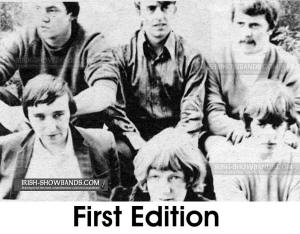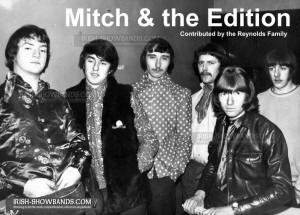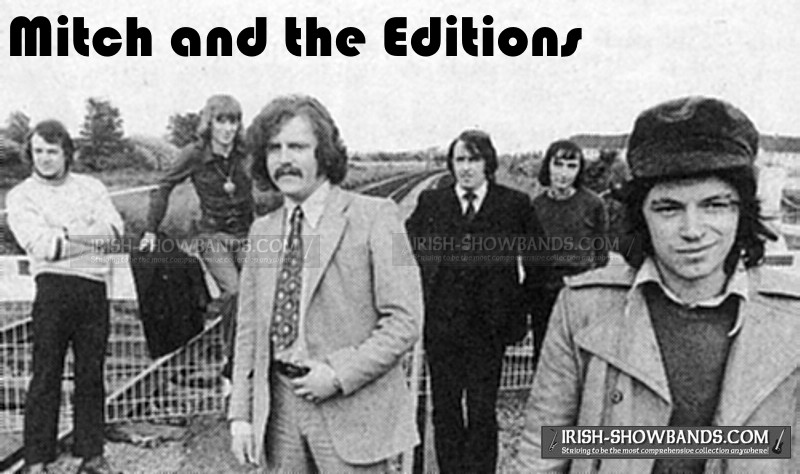Mitch and the Edition(s) Feature (1968
- 1972?)
Photo Gallery -
Band Lineups -
Discography
- Audio samples -
Where Are They Now?
The Story
 Mitch and the Edition (also sometimes referred to as the Editions)
were one of the few beat groups that managed to make the transition
from clubs to the ballrooms. Started in late 1968, the first mention
we have found of the band is in Pat Egan's Beat column in the
November 11, 1968 issue of Spotlight. He referred to the band as
"First Edition" and felt they were poised to become one of Dublin's
biggest beat groups. Over the next few months, the group continued
to grow their reputation, and eventually became one of Pat's
favourite bands on which he reported on a regular basis.
Mitch and the Edition (also sometimes referred to as the Editions)
were one of the few beat groups that managed to make the transition
from clubs to the ballrooms. Started in late 1968, the first mention
we have found of the band is in Pat Egan's Beat column in the
November 11, 1968 issue of Spotlight. He referred to the band as
"First Edition" and felt they were poised to become one of Dublin's
biggest beat groups. Over the next few months, the group continued
to grow their reputation, and eventually became one of Pat's
favourite bands on which he reported on a regular basis.
The original lineup was: Mitch
Mahon (vocals), Leslie Mulvey (guitar), Eamonn Tierney (bass), Paul
O'Hanlon (drums), Andy Dunne (keyboards), and Belfast man Paddy
Frawley on sax. 1969 started with Pat Egan claiming the lads were
one of the two best bands on the Dublin scene, but by May, in his
column he warned, "First Edition must find a new opening (and fast).
They are no longer a new group and more is expected now." Mitch
had previously been the vocalist with the Fugitives.
As the year progressed, the band
continued to gain in popularity ranking 6th in Pat's poll behind 1.
The Vampires, 2. Skid Row, 3. Bye Laws, 4. Fire Brigade and 5. Deep
Set.
As an interesting aside, in the
June 14th issue of Spotlight, Pat reported that Dublin beat groups
were pushing for higher fees for weekend gigs. The move was to set
£22 as a minimum fee. It is no wonder groups
started to lose members to the showband circuit as most of the top
showbands were paying more than twice that much weekly to each
musician in the band (and more). By August, Pat was touting First
Edition as having "joined the big leagues" of the top groups on the
scene in Dublin.
In September, the boys went into
the studio to record their first single
(still rare for the times), You Got
What I Need, which was written by keyboard player Andy Dunne.
Released on November 1st, the
record got decent airplay and further reinforced their reputation as
one of the hottest
groups on the club circuit. With the release of their single the
band started to play of the ballroom circuit, leaving behind their
beat group days.
 The
release of the single also brought about a change in name. It was
reported that the single might be released internationally. Back in
those days, there was already a big band called First Edition which
featured future superstar Kenny Rogers. The change would be to Mitch
and the Editions (throughout their history, their name was written
both ways, with and without the "s"). It was also reported in
Spotlight that the single was being released in the UK, but we
cannot verify it this was ever the case. (In fact, Pat Egan asked in
the November 28th issue of Spotlight why the British record
press had not received copies of the group's single).
The
release of the single also brought about a change in name. It was
reported that the single might be released internationally. Back in
those days, there was already a big band called First Edition which
featured future superstar Kenny Rogers. The change would be to Mitch
and the Editions (throughout their history, their name was written
both ways, with and without the "s"). It was also reported in
Spotlight that the single was being released in the UK, but we
cannot verify it this was ever the case. (In fact, Pat Egan asked in
the November 28th issue of Spotlight why the British record
press had not received copies of the group's single).
By the time the next popularity
poll appeared in Pat's Beat column in November, "Mitch and the
Editions" were ranked number two. The band was continuing to grow in
stature and appeared on the RTE series, Like Now, in November
as well. In December, Pye Records released a compilation album (on
their Golden Guinea label) of Dublin beat groups called "Paddy is
Dead and the Kids Know It" which featured two tracks by the Edition.
As the year ended, the band had achieved just about everything
possible for a Dublin group at the time without leaving the country
(as most groups opted to go to London). They were playing all the
major clubs and making good money (for a group as stated earlier).
Validation of the band's
increasing popularity came in early 1970 when they were voted 4th
best Irish Group behind Granny's Intentions, but ahead of Rory
Gallagher's Taste. In February, they went into the studios and cut
their second single, I Can't Stop. Photos in Spotlight
as well as a comment in Pat Egan's column confirmed the recording
session took place, however a few weeks later Pat reported the boys
had decided against releasing the single.
In May, 1970 there was plenty of
speculation about the band's future, especially their next record.
It was reported in The Evening Herald on May 2nd that the release
would be Couldn't Live Without You with the flip side as I
Can't Stop. In the summer of 1970, the band decided
to take the big plunge into the ballroom circuit. Pat Egan wondered
whether it was a good move on their part, asking "will they not now
just become another band?"
They signed with the Tom Costello organisation and were being
managed by Arthur Walters.
As an interesting side note,
groups that went "big" were always in a precarious situation. Before
making the move, they were often considered the "big fish" in the
small pond of Dublin's club scene, but afterwards, they were
competing with the country's top entertainers with major publicity
machines at work (and financial backing). At the same time, the free
publicity they had been enjoying via Pat Egan's beat group column
disappeared. Finally, playing to a stuffed club which held a few
hundred people was much different than a ballroom which had
comfortably held over 2,000 the week before for the Royal, or the
Miami, or the Dixies.
For the rest of 1970, the band
worked hard to establish themselves on the national ballroom
circuit. Manager Arthur Walters
spoke of the move in a 1971 Spotlight interview, "At first it looked
a bit sad and we were inclined to fear the worst, but things have
certainly changed." Slowly but surely, the group gained acceptance
by more and more halls, but the bigger ballrooms still eluded them.
"Said Arthur, "In the early stages most of the major halls didn't
want to know us, but but the few that did were so happy with the
band that word got around and soon everything was swinging for us."
 In
April, 1971, Pat Egan reported in his column that Mitch Mahon was
set to leave the band and join the group Alyce. "It's something I
have wanted to do for a long time" Pat reported Mitch had said to
him earlier. However, this never happened as Mitch was still going
strong with the band in June and beyond. Around this time, the band
also had a change in their lineup as Eamonn Tierney left and was
replaced on bass by Alan Murray. We think that former Creature, Liam
McKenna may have spent some time with the group as we think he is
picture below with the band when they played at the wedding of Chet
Atkins' daughter.
In
April, 1971, Pat Egan reported in his column that Mitch Mahon was
set to leave the band and join the group Alyce. "It's something I
have wanted to do for a long time" Pat reported Mitch had said to
him earlier. However, this never happened as Mitch was still going
strong with the band in June and beyond. Around this time, the band
also had a change in their lineup as Eamonn Tierney left and was
replaced on bass by Alan Murray. We think that former Creature, Liam
McKenna may have spent some time with the group as we think he is
picture below with the band when they played at the wedding of Chet
Atkins' daughter.
In May, 1971, the band finally
released a second single, I'm Going Home, on the Polydor
label which was again written by Andy Dunne. Once again the record
received airplay on Radio Eireann, but did not make the charts. A
few months later they released Hey Diana, also on Polydor and
with the same result.
In early 1972 the band appeared on
the legendary "Ken's Club" which was a radio show hosted by DJ Ken
Stewart when bands came into the studio and recorded live tracks (as
opposed to just playing their records), although most bands,
including the Edition, simply played their most recent releases. In
April, Mitch was involved in the recording of "Freedom Peace and
Unity" which was written by the Swarbrigg Brothers, and released by
the Times, but featured an all star cast including Derek Dean
(Freshmen), Bobby Kelly (Sands) and many others.
The last advert for the band
Mitch and the Edition we can find was in November 1972,
altho9ugh in October, there was an advert for their "Final Farewell
Gig." On November 11th, 1972 there was an advert for Seezers (a
night club on Abbey Street in Dublin) advertising "Mitch
(ex-Editions) and his new Superband." At this point, we are not sure
what happened to the band. We think they released another
single, but we do not know the date or the label. We will continue
to check our sources and if you know anything about their history
after 1972, we invite you to send us an email and let us know.
More to come.....
click on thumbnails for full image
